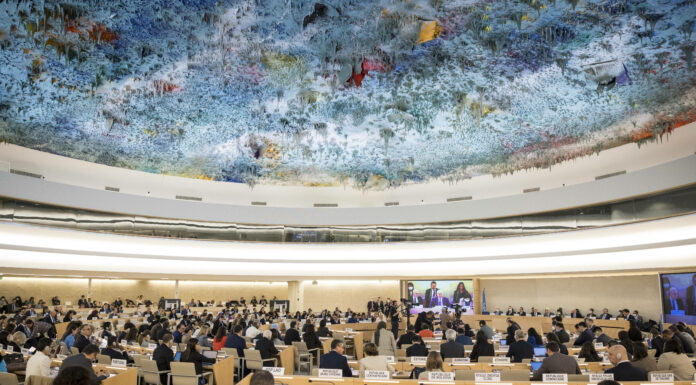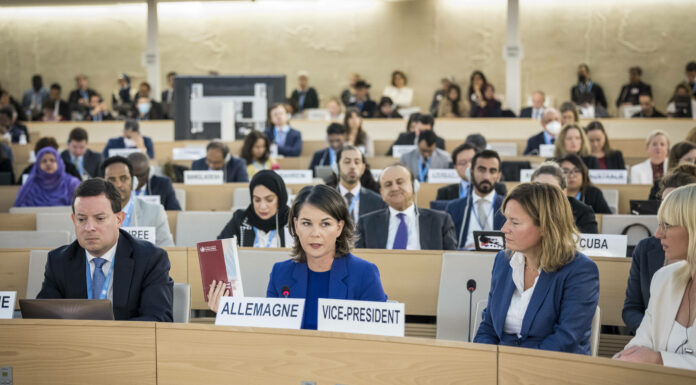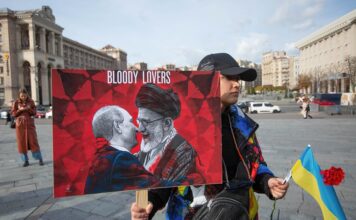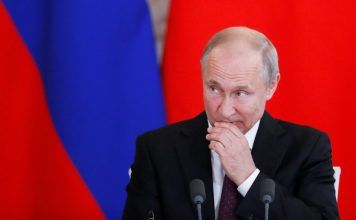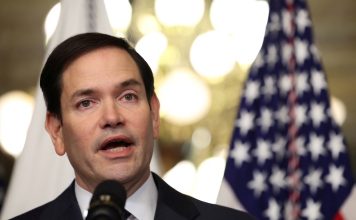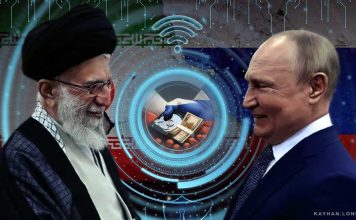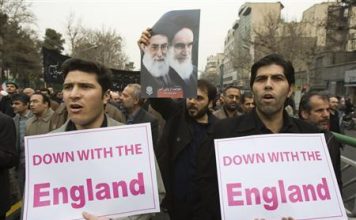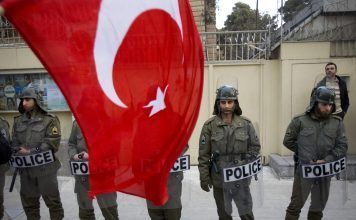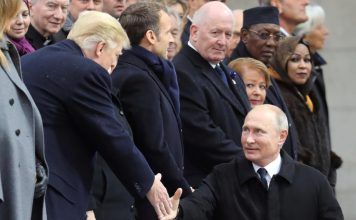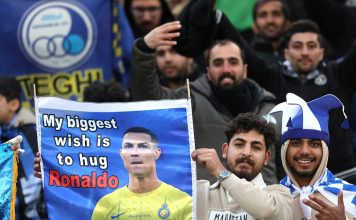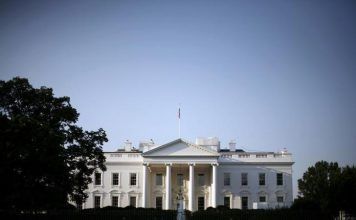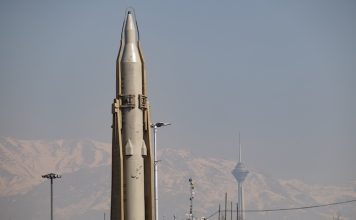The United Nations Human Rights Council (OHCHR) approved a resolution calling for an independent investigation into nationwide protests in iran which are in their 10th week and have left more than 400 people dead. The resolution was passed in a Nov. 24 Special Session about the human rights situation in the country.
Member states who voted for the resolution clapped and cheered as it was passed.
[aesop_image img=”https://kayhanlife.com/wp-content/uploads/2022/11/2022-11-24-at-15.23.28.png” panorama=”off” credit=”KL./” align=”center” lightbox=”off” captionsrc=”custom” captionposition=”left” revealfx=”off” overlay_revealfx=”off”]
Questions remain about how the investigation can be launched and implemented without the Iranian government’s cooperation.
The day-long session, which was the first of its kind on Iran, was proposed by Germany and Iceland. The motion passed with 25 member states voting for the resolution, 6 voting against, and 15 abstaining. Several of the states that voted against the resolution or abstained have economic or diplomatic ties with Iran.
The first of two meetings of the UN special session was opened by the President of the Human Rights Council, Ambassador Federico Villegas. Opening statements were made by the UN High Commissioner for Human Rights Volker Turk and the Special Rapporteur on the human rights situation in the Islamic Republic of Iran, Javaid Rehman.
“We are now in a full fledged human rights crisis,” High Commissioner Turk said. “The images of children killed, of women beaten in the streets, of people sentenced to death. We have seen waves of protests [in Iran] over the past years, calling for justice, equality, dignity and respect for human rights. They have been met with violence and repression. The unnecessary and disproportionate use of force must come to an end.”
[aesop_image img=”https://kayhanlife.com/wp-content/uploads/2022/11/2022-11-24T000000Z_1848803747_MT1IMGOST000XC6385_RTRMADP_3_IMAGO-IMAGES-scaled.jpg” panorama=”off” credit=” Annalena Baerbock participates in the special session of the United Nations Human Rights Council on the human rights situation in the Islamic Republic of Iran Here with Volker Tuerk R , High Commissioner for Human Rights and the Icelandic Foreign Minister in Geneva Switzerland. REUTERS./ ” align=”center” lightbox=”off” captionsrc=”custom” captionposition=”left” revealfx=”off” overlay_revealfx=”off”]
Rehman called the session “a historic moment for the people of Iran.”
“Jina Mahsa Amini’s death sparked nationwide outrage and moved the world’s conscience,” Rehman said.
The uprising in Iran began in mid-September after the death of 22-year-old Jina Mahsa Amini while she was in the custody of the country’s morality police. Now in their tenth week, the protests have turned into a countrywide call for regime change. More than 400 Iranians have been killed so far by the Iranian security forces, including at least 58 children, according to the US-based Iran Human Rights Documentation Center. An estimated 14,000 have been arrested.
Iran’s government has begun to issue death sentences for people who took part in the demonstrations. Amnesty International has said this is part of a plan to quell the protests and dissuade demonstrators.
During the UN session, the floor was opened to member states, observers, and Non-Governmental Organizations (NGOs) to share their views about the situation in Iran. The session was attended by 21 member states and an EU delegate representing the bloc; 30 observer states; and more than 15 NGOs.
Responding to the session’s launch and the resolution, Iran’s representative, Khadijeh Karimi, called the meeting an abuse of the council by “arrogant states to antagonize a sovereign UN member state. Using the common cause of human rights [as a] tool for political purposes of a specific group of western countries is appalling and disgraceful,” Karimi said.
“We are all watching with horror as events unfold in Iran. And yet what we see is so very limited due to the communications blackout imposed by the authorities,” the United States representative Michèle Taylor said. “We are deeply disturbed by the detention and killing of children, including nine-year-old Kian Pirfalak, and we condemn the sham trials and death sentences for those peacefully protesting.”
The UK’s representative Simon Manley read out the names of several children and young people killed by security forces during the protests, and added, “Let me send a clear message to their families, their friends, that their deaths will not be forgotten. Let us remember the more than 350 people killed; the countless children that have lost their lives; the thousands of people currently detained; the people sentenced to death; all for simply exercising their rights to freedom of expression and assembly.”
During the break, the UN held a press stakeout for journalists to put questions to the UN High Commissioner for Human Rights. Turk said the UN had received several human rights reports from Iran’s government but the UN was “not satisfied” with the documents. Additionally, the UN had offered to establish an office in Iran but had not received a response from the government.
Member States discussed the UN’s draft resolution and an amendment by China to remove a clause in the resolution allowing for the implementation of an independent investigation, at the second session. China’s amendment was rejected by the council, with 6 states voting in favor of the amendment; 15 abstaining; and 25 countries voting against the proposed change.
China, which is a UN member state and has ties with the Islamic Republic, said the Resolution was “overwhelmingly critical of Iran” and that it was “not universal, impartial, objective, non selective or non-politicized.”
Iran Protests Have Caused Deaths of Staggering Number of Children
Amnesty International also provided a statement for the session, which focused on the deaths of children and young people. Article 19, an NGO focusing on freedom of expression called the situation in Iran “a crisis of impunity” amid a lack of accountability at government level for the protests. NGO the International Federation of Journalists raised concerns about threats faced by Iranian journalists around the world reporting on Iran developments. The International Lesbian and Gay Association shared a statement about the rights of LGBTQ+ individuals in Iran, who are routinely persecuted by Iran’s government.

